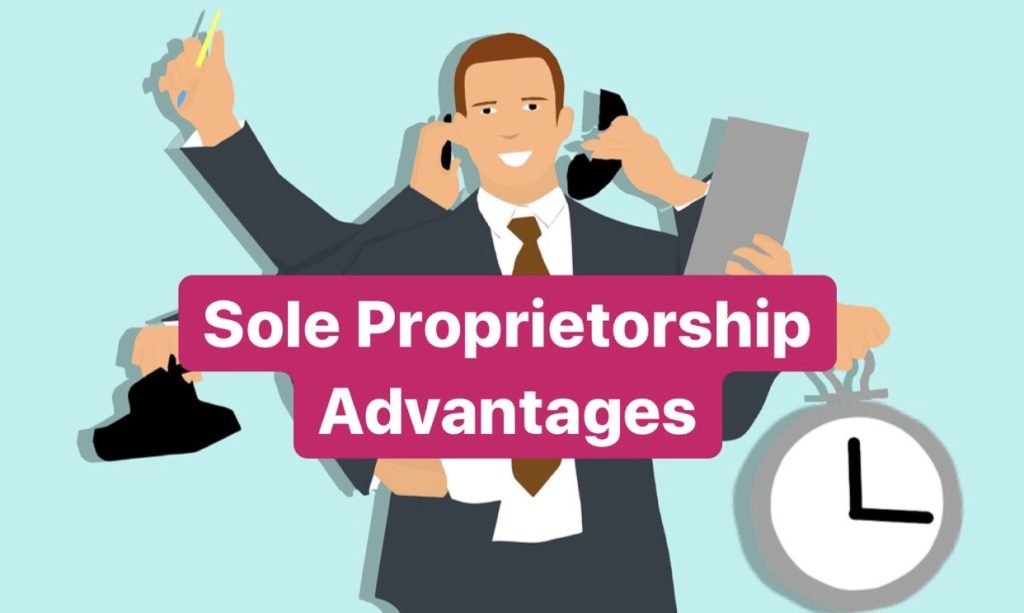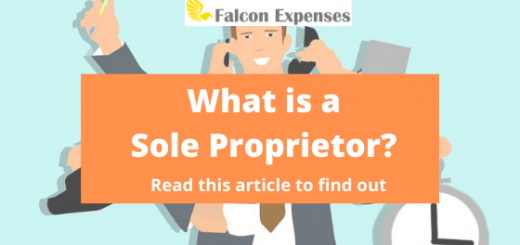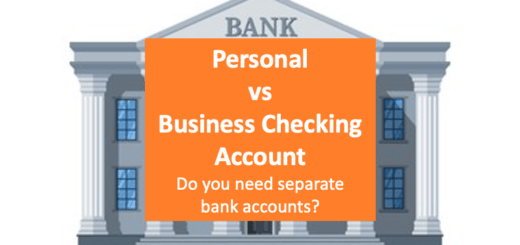Sole Proprietorship Advantages (Some Will Surprise You)
Table of Contents
Are you considering sole proprietorship? Do you dream of self-employment? Read to learn top sole proprietorship advantages.

Many people dream of self-employment, of never having to go to an office again. No boss. No one to answer to. That is where sole proprietorship comes in. In this article, we cover the advantages of a sole proprietorship.
What is a sole proprietorship?
According to the US Small Business Administration, a sole proprietorship is the simplest and most common business structure. It’s defined as an unincorporated business owned and run by one individual with no distinction between the business and the individual. Basically, a sole proprietor is a one-person business that is not registered with the state as a business entity. This means that the sole proprietorship becomes the business type for income tax purposes.
Are independent contractors sole proprietors?
Independent Contractor vs Sole Proprietor
The terms sole proprietor and independent contractor are often used interchangeably. This is because it’s not uncommon for someone to be both an independent contractor and a sole proprietor at the same time. Now you’re probably confused and wondering what are the differences between a sole proprietorship business and an independent contractor. Let us explain. So what is a sole proprietor vs an independent contractor?
What is an independent contractor?
An independent contractor is an individual who works for someone else, not as an employee. They provide services, versus selling products. For example, a web expert, creative professional, technical person, etc. An independent contractor vs a sole proprietorship is any type of business entity, such as a corporation, LLC, partnership, or sole proprietor.
Independent contractors receive 1099-MISC forms at the end of the year from the companies that they work for. Starting in the 2020 tax year Form 1099-NEC will be used. Employees receive a W-2 at the end of the year from their employers. Both of these forms show the total income received from their work. However, the difference is how their income is taxed. Payroll taxes are deducted from each paycheck when you’re an employee. This includes self-employment taxes such as Social Security and Medicare. When you’re an independent contractor these taxes are not automatically deducted and are instead paid by the contractor.
Also, as an independent contractor, you keep track of your own income and your expenses. Independent contractor income and expense information is entered into Form Schedule C, which is attached to an individual’s Form 1040 at the end of the year. An easy way to track business expenses is with a mobile app like Falcon Expenses.
How can you be an independent contractor and a sole proprietor at the same time?
You are both an independent contractor and a sole proprietor if you work independently and provide professional services to other people and businesses. To work independently means you don’t work under a registered business entity such as an LLC, corporation, or partnership. Independent contractors and sole proprietors are business owners or the type of business entity known as a sole proprietorship. They both file taxes using a Schedule C. In addition, they both pay self-employment taxes.
Related: Can a sole proprietor have a business bank account?
So what’s the difference between a sole proprietor vs independent contractor?
The main difference is how income is received. A sole proprietor received income from selling the product(s) and/or services. When a sole proprietor sells services they earn 1099 income and receive a 1099-MISC (or in 2020 a 1099-NEC) from whomever they work. An independent contractor only earns 1099 income. 1099 income is income received for professional services, such as consulting, web development, etc.
Advantages of a Sole Proprietorship vs Independent Contractor
Below we explain a few of the many benefits of a sole proprietorship.
- Easy to form. No corporate formations.
- Complete control. You only answer to yourself.
- Simple tax filing. Attached a Schedule C form to your 1040, that’s it!
- Owner gets all income. There’s only one owner, so all profits go to you.
- Privacy. Sole proprietorships are not subject to public disclosure.
Easy to Form
When we talk about formation, we are referring to incorporating, such are forming a corporation, LLC, or a partnership (unless you’re a single-member LLC). All of these are complex processes that require time and money. In regards to a sole proprietorship, you don’t have to form anything. All you have to do is start doing business.
Complete Control
Since you are the only owner of your sole proprietorship you have complete control of your business and business activities. This means that you’re in control of your profits (and losses). More importantly, you don’t need to consult or get approval from partners, officers, shareholders, or directors. Instead, you are the sole decision-maker.
Simple Tax Filing
With a sole proprietorship vs independent contractor, you do not have to file separate taxes for your business. Instead, you simply attach an IRS Schedule C form (Profit and Loss from a Business) to your annual IRS Form 1040. Review the following article for detailed information on the IRS Schedule C form, What is an IRS Schedule C Form (and What You Need to Know About It).
Owner Gets All Income
Since by definition a sole proprietorship has only one owner, this means all profits and income go to the owner. However, the same is true for losses. If you don’t make a profit then you don’t get anything.
Privacy
Sole proprietorships are not subject to public disclosure like LLCs and corporations because they’re not required to file any formation documents or annual reports. LLS and corporations are required to file certain documents and annual reports with state and federal governments, some of this information is publicly available. This doesn’t apply to single-member LLCs because they are sole proprietorships.
Disadvantages of a Sole Proprietorship vs Independent Contractor
It wouldn’t be fair if we didn’t include a section about the disadvantages of a sole proprietorship. This is because it is important to stay objective despite the fact that this article is about sole proprietorship advantages.
Liability of Debts
Your business debt becomes your personal debt when there’s no legal distinction between personal and business assets. The legal distinction is established when you incorporate an LLC, corporation, or partnership. But these business types come with complex formations, extra costs, more complex taxes, annual reports, and other headaches. Therefore, a sole proprietorship is a way to go if you’re interested in starting a simple business with no debts or lines of credit.
Full Responsibility
This is both an advantage and a disadvantage, depending on who you ask. At the end of the day, you are fully responsible for all of the day-to-day business decisions.
Sole Proprietorship Taxes
Sole proprietors do their taxes by filing a Schedule C form with the IRS. You pay business income taxes on the income that your sole proprietorship business earned by filing an IRS Schedule C form.
How do I know to use a Schedule C and not another tax form for my business?
The IRS automatically considers your business a sole proprietorship if you haven’t registered as another legal entity such as an LLC, corporation, or partnership.
How do you become a sole proprietor?
You don’t need to register your business with your state to become a sole proprietor. All you have to do is start doing business and at the end of the year attach a Schedule C form to your 1040 form to report the profits and losses from your business.
Sole Proprietorship Examples
Example 1
Maria is a web developer. She develops websites for more than one company at a time. Currently, she is working on five web development projects. Because she is not an employee of any company and she works for herself she can work with more than one client at a time. She earns about $5000 to $10,000 per month as a web developer. Last year she earned $75,000 between ten different clients. Each client gave her a 1099. She included the income earnings data from each 1099 on her Schedule C form, which she attached to her 1040 when filling her personal income tax return. She also included her tax-deductible expenses. Last year she bought a new computer for her work, so she was able to deduct that purchase accordingly from her taxable income.
Example 2
John makes custom wood picture frames for people. It was a side gig that turned into full-time self-employment work a few years ago. He earns about $45,000 a year making custom frames for paintings and homes. John never incorporated, as he didn’t want to deal with the hassle of all of the paperwork, reporting, and extra costs. Instead, he is a sole proprietor who sells a product, wood frames. Therefore, at the end of the year, he reports all of his businesses income on a Schedule C form. On this form, he includes his gross sales and all of his expenses. His expenses include the cost of goods sold, such as the wood and other supplies required to make the frames. He attaches his completed Schedule C form to his 1040 form and files his taxes.
About Falcon Expenses
Falcon Expenses is a top-rated mobile application for self-employed and small businesses to track expenses and tax deductions. Falcon customers record $6,600, on average, in annual tax deductions. Get started today. The longer you wait, the more tax deductions you miss out on.
Automatically track mileage expenses and expenses, keep an odometer log, receipt vault and log billable hours. Quickly organize expenses by time period, project, or client. Easily prepare reports to email to anyone in PDF or spreadsheet formats, all from your phone. Use for keeping track of tax deductions, reimbursements, taxes, record keeping, and more. Falcon Expenses is great for self-employed, freelancers, delivery drives, realtors, business travelers, truckers, and more.
Was this article helpful?

I used to travel a lot for work. Doing my expenses frustrated me. I would delay submitting them and when I did, I would spend hours taping receipts to paper to scan for my boss. I knew there was a better solution, and I had a background in productivity software, so I created Falcon Expenses. I enjoy creating software that makes people’s lives easier.
In addition, I’m an avid skier and I enjoy hiking, sailing, and cooking.






Not only will entrepreneurs need to make sure their state tax authority is paid in full, but they may also need to formally file a notice to shareholders and take extra steps to formally dissolve the business. Get up to date on your tax obligations: File your final payments and returns with the IRS. Make sure you follow your state s laws on the dissolution process. It ll help you avoid surprise taxes and penalties. Shut down any licenses or registrations under the name of your business.